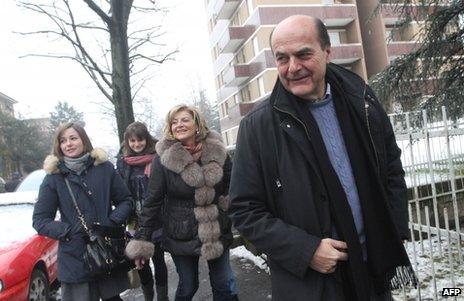Profile: Pier Luigi Bersani
- Published

Italy's Pier Luigi Bersani, a former Communist with a track record in government as an economic liberal, led the centre-left into February's elections only to announce he was resigning less than two months later.
The fact his coalition was unable to secure outright victory in both houses of parliament, and only scraped a wafer-thin majority of the popular vote, raised questions about his ability to return the traditional left to power after five years out of office.
The image of this 61-year-old veteran of party politics is that of a down-to-earth organiser, a man who turned out to cast his vote in a jumper and no tie.
His stolid style stands in stark contrast both to his 2012 rival for the leadership of the Democratic Party (PD), the youthful mayor of Florence Matteo Renzi, and to the man who dominated politics for most of the past two decades, Silvio Berlusconi.
"We can't win by telling fairy stories," he said at the start of the 2013 campaign, when he promised to stand by the austerity measures of Mario Monti's technocratic government.
But it was hardly the most winning formula, given the huge vote for Beppe Grillo's protest party, which undoubtedly lured many Italians who would otherwise have voted for Mr Bersani's bloc.
Catholic and Communist
Pier Luigi Bersani was born 29 September 1951, the son of a petrol station mechanic, in Bettola, near Piacenza in the northern region of Emilia Romagna. He is married to a chemist from his home town and the couple have two daughters.
A practising Catholic, he wrote a thesis on the history of Christianity for his philosophy degree at the university of Bologna. In a recent TV debate, he named the late Pope John XXIII as a personal hero.
After a brief spell as a teacher, he worked his way up through the ranks of the region's Communist Party.
He became the party's regional president in 1993 as the Italian left was struggling to modernise, following the end of the Cold War and cross-party corruption scandals.
In 1996 he entered government for the first time as industry minister under then-Prime Minister Romano Prodi. He pushed through the liberalisation of the electricity market in 1999, before switching to the transport ministry.
"As a minister, Bersani was far more of a reforming free marketer than most of the centre-right," Professor James Walston, a political scientist at the American University of Rome, told the Christian Science Monitor in a recent interview.
After the centre-left lost power in 2001, Mr Bersani embarked on a nation-wide tour of Italian industrial sites, writing a book and then a series of policy proposals as he returned to government as minister of economic development in 2006.
But his campaign to liberalise several more areas of the economy ran into fierce resistance from Italy's entrenched interest groups - a campaign that was later picked up by Prime Minister Monti.
In 2009 the left was back in opposition, and the recently formed PD - which incorporated former Communists and others - held a primary to elect its leader.
Mr Bersani easily beat the more centrist Dario Franceschini and took up the challenge of presenting a convincing alternative to Mr Berlusconi.
After the centre-left failed to form a government following the February polls, unrest with his leadership grew within the PD, finally boiling into open revolt when MPs rejected Mr Bersani's choices of candidate for president in the secret ballot.
Condemning party "traitors", Mr Bersani told the party he was stepping down.
Roots and leaves
True to his roots, Mr Bersani appears most at home chatting with the party faithful at rallies or summer festivals, cigar between the teeth.
The long-time rock music fan (favourite bands include AC/DC and the Rolling Stones) has tried to freshen his image by engaging in social media and pledging to "make space" in the party for younger generations.
After his victory over Mr Renzi, he tweeted a photo of himself pouring beer in a bar for party volunteers.
Party officials say that if he comes to power, Mr Bersani's priorities would include cutting payroll taxes to create jobs, strengthening anti-corruption laws and bolstering state institutions.
He himself says he will continue Mr Monti's policies of "discipline and credibility" but will also emphasise his own priorities of "employment and fairness".
His humble roots and folksy way of talking are mocked by critics, while his cryptic sayings have been known to baffle journalists. "We aren't here to wipe the sea cliffs dry" and "When it rains, it rains for everyone" are two examples quoted in a Spiegel profile.
But Mr Bersani is clearly proud of his background. When he launched his campaign to lead the centre-left bloc in October, he made his pitch at the same petrol station from his childhood, where he once worked to help fund his studies.
"Without roots, you can't produce new leaves," he told supporters.
- Published2 December 2012